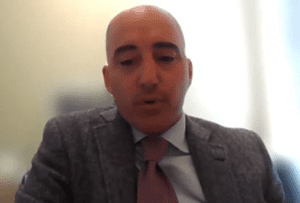Who is a member?
Our members are the local governments of Massachusetts and their elected and appointed leadership.

Assistant Administration and Finance Secretary Mark Attia discusses the Massachusetts Homeowner Assistance Fund during a meeting of the LGAC on May 10.
With foreclosures on the rise and financial pressures mounting on homeowners, municipal leaders can direct at-risk residents to a new state program to protect home ownership.
Through the Massachusetts Homeowner Assistance Fund, homeowners who are at least three payments behind on their mortgage for COVID-related reasons can receive aid for mortgage payments and other property-related costs such as taxes, insurance, condo fees and delinquent municipal utility bills. The program seeks to keep homeowners in their homes and prevent foreclosure proceedings.
The program, which started late last year, is already helping Pittsfield residents struggling to pay mortgages, taxes and other property-related costs, Mayor Linda Tyer said during the May 10 meeting of the Local Government Advisory Commission. This assistance has become especially critical now, she said, as pandemic-era moratoriums and forbearance programs have ended.
“Having this vital resource for preserving homeownership for at-risk Pittsfield homeowners for the foreseeable future is a really important element for all of our communities to create stable neighborhoods and ensure that our residents can remain in their homes,” Tyer said.
The program has $178 million in funding from the American Rescue Plan Act, Assistant Administration and Finance Secretary Mark Attia said during the LGAC meeting. The program is being administered by the Massachusetts Housing Partnership and the Massachusetts Housing Finance Agency, in collaboration with the Executive Office for Administration and Finance and several other state agencies, as well as community-based organizations and the state’s 10 housing counseling agencies. (Download the administration’s presentation on the program.)
“We were among the first states to hold a stakeholder listening session in preparation of our plan being submitted to the U.S. Treasury,” Attia said, “and we’re among the earliest to launch a full program, and we aim to keep up that momentum as aggressively as we can over the next several months.”
Before the pandemic, Massachusetts had a high number of foreclosures, and the numbers have been climbing again since the foreclosure moratorium ended about a year and a half ago, said Maureen Flynn, program director for the Homeowner Assistance Fund at the Massachusetts Housing Partnership. The foreclosures haven’t yet reached pre-pandemic levels, she told LGAC members, and she hopes this program will help keep that from happening.
To qualify, homeowners must have experienced a COVID-related financial challenge after Jan. 21, 2020, Flynn said. Applicants must also earn 150% or less of the area median income; be owner-occupants of a single-family home, condo or multi-family home of up to four units; use the home as their primary residence in Massachusetts; and have a conforming loan (not a jumbo loan). People who have reverse mortgages also may be eligible for assistance with taxes or insurance, she said.
Homeowners submit applications online, and can use a zip code search tool to identify their local housing counseling agency if they need help preparing and submitting an application. A case manager will review the file and determine eligibility, and then confirm the information with the mortgage servicer. When an application is approved, the program sends the funds directly to the mortgage servicing company. Flynn said the program is working directly with about 160 mortgage servicers.
In terms of outreach, Flynn said the program is focusing on the parts of Massachusetts experiencing the greatest need. The promotional campaign includes television ads in Springfield, New Bedford and Fall River; radio ads in Spanish and Portuguese; online ads on Facebook, YouTube and Google; bus ads; ads on check-cashing sleeves; and advertising outside of convenience stores, Flynn said. The program also has a fact sheet available in about eight languages, and has plans for a text campaign, she said. The program has also been working with municipal tax collectors to get notices included with property tax bills.
So far, the program has received more than 3,400 applications and made payments to help 422 homeowners, for a total of about $8 million, Flynn said, and more than 1,000 additional applications are awaiting payments. Of the approved applications, roughly half came from non-white borrowers, and 93.6% of the funded applications involved households under 100% of the area median income. So far, the program has served homeowners in 123 cities and towns, and the most-served communities have been Springfield, Brockton, Boston, Worcester, Methuen, New Bedford, Lynn, Agawam, New Bedford, Randolph, Chicopee and Pittsfield.
“We are hitting the folks that need this most, and the folks that the Treasury Department wants us to concentrate on,” Flynn said.